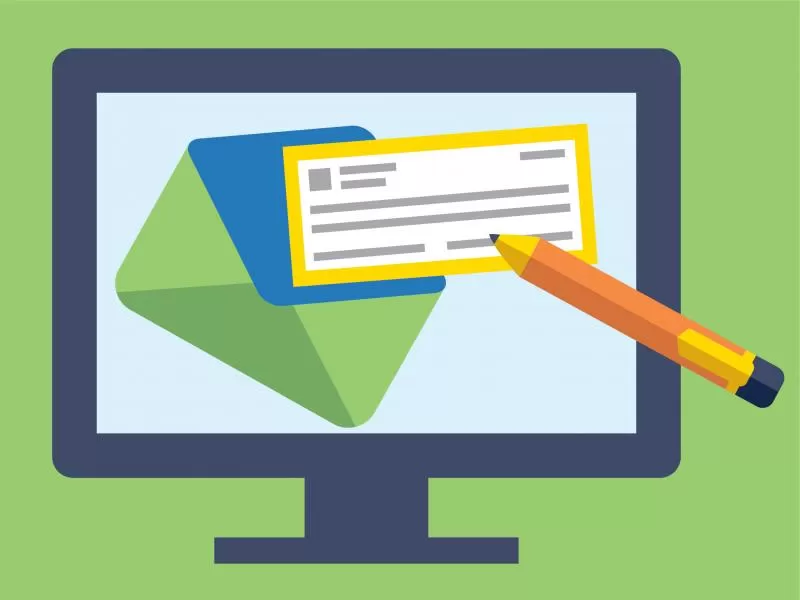Check Clearing for the 21st Century Act
A federal law, known as Check Clearing for the 21st Century Act (Check 21), makes it easier for financial institutions to electronically transfer check/share draft images, called substitute checks, instead of physically transferring paper checks.
Check 21 is a federal law that is designed to enable credit unions and banks to handle more checks electronically, which should make check processing faster and more efficient. Today, financial institutions often must physically move original paper checks from the financial institution where the checks are deposited to the financial institution that pays them. This transportation can be inefficient and costly. Check 21 became effective on October 28, 2004.

How does Check 21 affect you?
Because of Check 21 and other check-system improvements, your checks may be processed faster - which means money may be deducted from your checking account faster. Before you write a check, make sure that your checking account has enough money in it to cover the check.
-
What is Check 21 and what is its basic purpose?
Check 21 is a federal law that is designed to enable banks to handle more checks electronically, which should make check processing faster and more efficient. Today, banks often must physically move original paper checks from the bank where the checks are deposited to the bank that pays them. This transportation can be inefficient and costly. Check 21 became effective on October 28, 2004.
-
How will Check 21 make check processing more efficient?
Instead of physically moving paper checks from one bank to another, Check 21 will allow banks to process more checks electronically. Banks can capture a picture of the front and back of the check along with the associated payment information and transmit this information electronically. If a receiving bank or its customer requires a paper check, the bank can use the electronic picture and payment information to create a paper "substitute check." This process enables banks to reduce the cost of physically handling and transporting original paper checks, which can be very expensive.
-
Is electronic check processing secure?
Electronic check processing is not new to the financial industry and is a safe and reliable way of processing payments. It uses technology that has been developed and tested to process your check information securely.
-
Does Check 21 mean that customers can't get their checks back in their account statements?
No. Check 21 does not require customers to stop receiving checks back in their account statements. The contents of an account statement will continue to be governed by the account agreement between the bank and its customer. Rather, when banks have agreed to provide paid checks in statements, Check 21 permits the bank to provide either the original check or a substitute check.
-
What changes can I expect when Check 21 goes into effect?
If you are among the many customers of banks that do not receive your canceled checks with your account statement, you likely will not notice any change when Check 21 goes into effect on October 28, 2004. You will notice a change only if you receive a substitute check when you were expecting an original check. For example, if you receive canceled checks with your account statement, you might begin to receive a mixture of canceled original and substitute checks. If you receive image statements (pictures of several checks on a single page), you also may notice that some of the pictures are of substitute checks.
-
Will Check 21 increase the speed with which checks are cleared between banks?
The speed of check-processing already has increased in response to check-system improvements other than Check 21. Thus, even now, once a check is deposited with a bank, it is almost always delivered overnight to the paying bank and debited from the checkwriter's account the next business day. Check-processing speeds should continue to increase, over time, as banks make further operational changes in response to Check 21. That means money may be deducted from your checking account faster. Before you write a check, it's always best to make sure your checking account has enough money in it to cover the check.
-
Will Check 21 change how fast my bank must make my check deposits available for withdrawal?
Another federal check law (the Expedited Funds Availability Act) specifies the maximum times by which your bank must make funds available to you, though most banks make funds available faster than required. Check 21 did not change these maximum hold times. However, the Expedited Funds Availability Act requires the Federal Reserve Board to reduce maximum hold times in step with reductions in actual check-processing times. Thus, over the longer term, if Check 21 sufficiently increases the speed of check processing, the Board will reduce maximum hold times.
A bank's decision to place a hold on funds you deposit by check does not affect the interest that you receive on the deposited funds. Specifically, if you deposit a check into an interest bearing checking account, your bank is generally required to begin to credit interest to your account no later than the business day on which the bank receives credit for the funds.
-
What is the difference between Check 21 and programs that convert checks to electronic payments?
A check you write may be processed as a check. In that case, your rights are governed by check laws and regulations. Some merchants, however, may use your check as a source of information to create an electronic fund transfer. You must receive notice that your check may be processed this way. Electronic fund transfers are governed by different laws and have different consumer rights than check payments.
Related Resources
- Substitute Checks
- Overdraft and NSF Fees
- Understanding a Check & Balancing a Checkbook
- Credit Cards
- Electronic Banking


